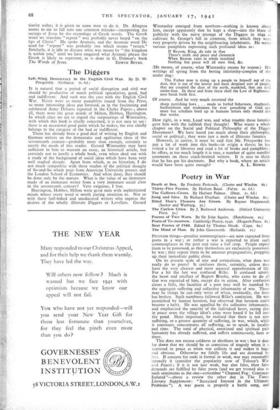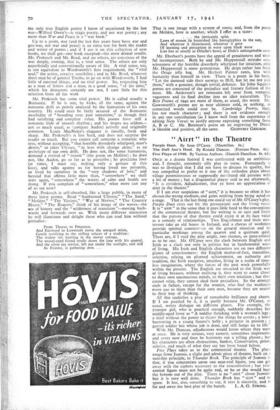Poetry in War
(Secker and Warburg. 5s.)
PECULIAR things—peculiar commonplaces—are now expected from poets in a war ; or rather a war is expected to plant such commonplaces in the poet and raise a full crop. People expect them to be possessed, as they themselves are exclusively possessed, by war ; they expect them to be amateur propagandists, propping up their immediate public chins.
On its present scale of size and compulsion, what does war really do to poets? It confuses them, certainly, unless they have the very clearest and most unusual apprehension of life. For a bit the last war confused Rilke. It confused utterly the heart and intellect of Rupert Brooke, who came to do all that was expected of him, except die in action. After confusion clears a little, the faculties of a poet may well be numbed by the aggregate suffering and collective inhumanity of war. These may be things he can only write of when, eventually, the frost has broken. Such numbness followed Rilke's confusion. He was astonished by human heroism, but observed that heroism could become a habit. He was appalled by the collective inhumanity, and emphasised the sanctity of the individual heart, saying that in peace even the village idiot's cries were heaid" if he fell into the pond. More important, he realised that there is not new suffering, or a greater quantity of suffering, in war, which, while it continues, concentrates all suffering, so to speak, in locality and time. The total of physical, emotional and spiritual pain humanity has already suffered, and suffers continuously, here or there.
This does not excuse coldness or aloofness in war ; but it does lay down that we should be as conscious of tragedy when it is scattered in peace as when war collects it and makes it huge and obvious. Otherwise we falsify life and are drowned by war. If concern for ends is formal or weak, war may reasonably intensify it (consider the popularity now of Tolstoy's War and Peace); if it is not just weak, but also false, then false demands are fulfilled by false poets (and we get treated also to such sentiments as the one—remember " Channel Fog: Continent Isolated "—above a review the other day in The Times Literary Supplement: " Sustained Interest in the Ultimate Problems "). A war poem is properly a battle song, and the only true English poetry I know of occasioned by the last war—Wilfred Owen's—is tragic poetry, and not war poetry ; any more than War and Peace is a " war book."
Up to a point, war (and the last five years have been war and pre-war, not war and peace) is an extra test for both the reader and writer of poems ; and if I use it on this collection of new books, we shall get—one book excepted—the most dismal results. Mr. Prokosch and Mr. Read, and no others, are conscious of the war deeply, owning, that is, a vital sense. The others are only superficially and conventionally aware of life. A vital sense, too, is not equivalent to Wordsworth's first requirement, the " vital soul," the active, creative sensibility ; and in Mr. Read, whatever there may be of general Truths, to go on with Wordsworth, I find little of external things, and no vital power. So, respecting him as a man of letters and a man, in a good sense, " of his time," which his detractors certainly are not, I care little for this selection from all his work Mr. Prokosch has some vital power. He is called usually a Romantic. If he is one, he kicks, all the same, against the romantic drift so primly analysed by the humanists of his own country. He could once be fairly accused of the Romantic morbidity of " brooding over past sensations," as though they had satisfying and complete value. His poems have still a romantic slide of smooth rhythm ; and his tropes are seldom— not so much usual, as (compare Auden) actively and originally common. Louis MacNeice's elegance is tinselly, fresh and sharp. Mr. Prokosch's is less hard, and does not surprise the reader so much. But you cannot call someone a romantic who sees, without accepting, "that horrible disorderly whirlpool,.man's desire," or takes Ulysses, " in love with change alone," as an archetype of our own drift. He does not, like some humanists, demand a revival of " reason " (the poem on Moliere) ; he does not, like Auden, go so far as to prescribe ; he proclaims love (at times, I must say, making only a gesture of this love), and talks against us for having loved too privately, or lived by ourselves in the " very shadows of love," and beyond that affirms little more than, " somewhere " we shall start again, " somewhere " the waters of calm and health are rising. If you complain of " somewhere," what more can any of us say now?
Mr. Prokosch is self-absorbed, like a large pebble, in many of these latest poems. Read " Sunburned Ulysses," " The Sand," "Moliere," "The Victims," "War of Nerves," "The Country House," " The Reapers," think of his image of the waves—the sea of history and the " wilderness of transition "—moving back- wards and forwards over us. With many different intensities he will illuminate and delight those who can read him without prejudice : From Thurso to Penzance, And Eastward to Lowestoft move the unequal mists, Gently testifying to the stifling solaces of a tradition: The widow sits knitting in the mossy cottage, The weasel-eyed friend strolls down the lane with his spaniel, And the silver tea service, left out under the starlight, and still As Everest, is gathering dew.. . That is one image with a system of roots; and, from the poem on Moliere, here is another, which I offer as a taste:
. . . the intricately spun
Laws of reason lie burnished like hieroglyphics in the sun, And whatever it illuminated, whatever it gave Of learning and perception in wave upon black wave Lies lost as utterly as Othello's howl, or Dido's unforgettable cave.
Mr. Eberhart's poems have the appeal of genuineness and wist- ful incompetence. Both he and Mr. Heppenstall mistake con- sciousness of the horrible disorderly whirlpool for intuition, only Mr. Heppenstall is more pretentious. He drips rather late from the Orage jelly bag. Mr. Herbert Palmer rants, less with humanity than himself in view. There is a poem in his book, " Let the damned ride their earwigs to Hell, but let me not join them," with a genuine, though trivial, defiance. Sir John Squire's poems are concocted of the prejudice and literary fashion of the mass. Mr. Anderson's are remnants left over from romantic vagueness and its final decline into an idiot naturalism. The Best Poems of 1940 are most of them, as usual, the worst. Mr. Gawsworth's poems are as near ultimate cold, or nothing, as connected words could ever be. Cambridge Poetry, 1940, has not much character ; and there is not evidence enough in any one contribution (as I know well from the experience of editing New Verse) to justify anyone expecting something from A, B or C. Mr. Bateman's poem on an engraving by Darer is likeable and positive, all the same. GEOFFREY GRIGSON.































 Previous page
Previous page